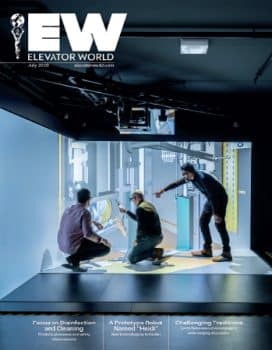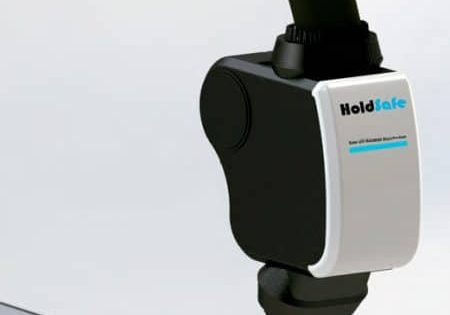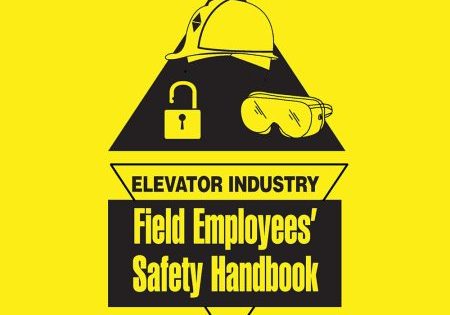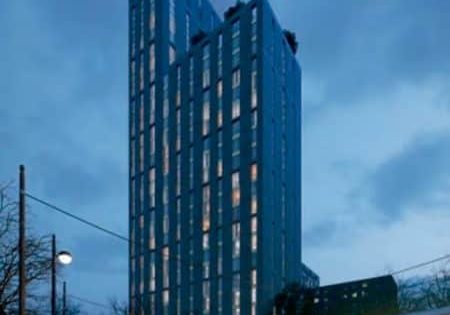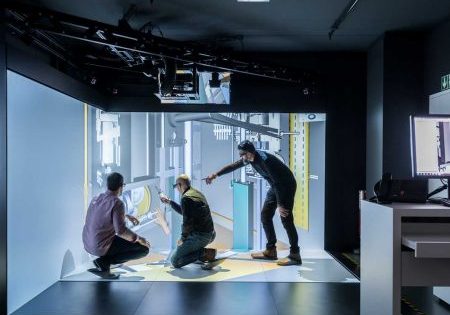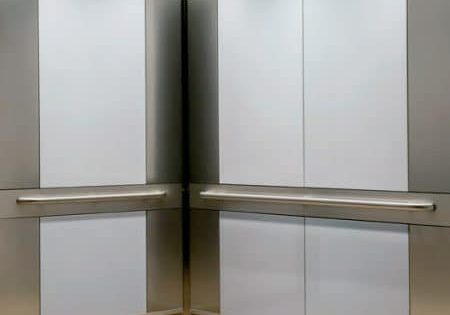Antimicrobial passenger protection
Jul 1, 2020
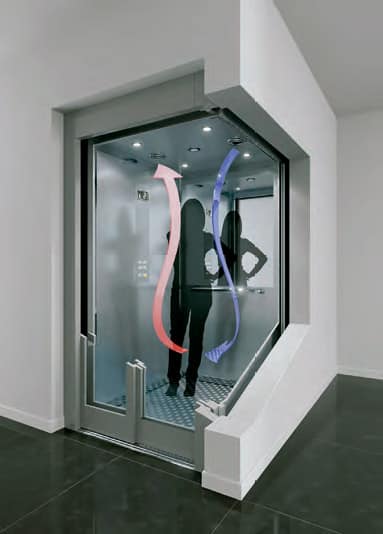
Many facets of antimicrobial passenger protection are detailed in this dedicated section.
Covers for Elevator Buttons, Panels
Kapok 88 of Long Bennington, U.K., has designed protective flameproof PVC Hygiene Covers for lift control panels and push buttons. Intended to make the components much easier to keep clean, thus reducing the risk of spreading germs and viruses, they can reduce contagion risks for users and keep moisture away from electrical parts. They come in two standard sizes and can be manufactured in custom ones on request.
Richard Annable, Kapok 88 managing director, said of the products in May:
“They have gained a lot of interest over the last few weeks, with some of our hygiene covers being sent out to Italy and Germany. They [are] easy to install using self-adhesive Velcro®, and, once in place, the lift can still be operated and wiped clean.”
Foot-Activated Call Button
Mississauga, Canada-based MAD Elevator’s new Toe-To-Go foot-activated elevator call button enables activation of hallway and car buttons by shoe, instead of by hand, to reduce the risk of transferring germs by creating a hands-free experience. The pedal-style buttons are designed for robustness and easy functionality, allowing the passenger to keep their heel on the ground to activate the button with their toes. “This not only keeps the elevator clean, but also adds a layer of convenience to passengers with full hands,” the company added. “With no code alteration or submission required for modification, the is ready to be installed with any existing elevator.”
Options are stainless steel or brass; surface- or flush-mount for hall stations; red, green, blue, white or amber illumination; and a keypad option for car operating panel. Toe-To-Go is to be wired in parallel to existing buttons (24 V for illuminated and 120 V for nonilluminated). It is already being used in large scale across North America by MAD and Vantage Fixtures Designed & Made by MAD (p. 28)
Escalator Handrail Sterilization System
U.K.-based Aseptic Ltd.’s ClearWin is a self-powered escalator/moving-walk handrail sterilizer. Intended to sanitize a variety of pathogenic bacteria and viruses users may leave on the handrails after using them, the product is said to eliminate 99.99% of harmful surface germs by utilizing UV-C wavelengths. It fits on the vertical end of a unit’s handrail to offer continuous disinfection. Features include the ability to install it while the escalator/moving walk is running, light weight, no passenger slowdown and a lamp life estimated at 10,000 hr.
Air Sanitation and Car Sterilization Kit
Italy’s IGV Group SpA has introduced CARe, an air sanitation and elevator car sterilization kit the company says can be installed in any lift. Aimed at eliminating risk of contagion by sanitizing cabs with antimicrobial cleaning, it utilizes a UV-C ultraviolet LED light and a ventilation device that combines a high-efficiency particulate air filter and activated charcoal membrane. This automatic operation initiates when no passengers are inside to remove viruses and bacteria in the particulate. A vacuum takes air from the cab and channels it through pipes to where it is filtered and purified, then returned to the cab. CARe is designed to be easy to install, invisible, noise-free, energy efficient and reliable. The sanitizing device does not involve the use of ozone, which could be irritating without adequate air exchange.
KONE Tailors Products to Pandemic
KONE said its global pandemic-related solutions include tailoring its People Flow Planning and Consulting service (ELEVATOR WORLD, March 2019) to better support planning a safe return to offices and other buildings. It uses data, simulation tools and expertise from the company’s interior architects and data scientists to reduce crowding and bottlenecks. Additionally, KONE reminds that its DX Class elevators (EW, February 2020) include antimicrobial surfaces for elevator car walls and handrails to protect against indirect contamination. The line’s built-in connectivity allows it to be quickly updated to add new digital services and other upgrades.
The new KONE AirPurifier is designed to improve air quality in the elevator car by destroying most potential pollutants, like bacteria, viruses, dust and odors. Its uses photocatalytic oxidation technology developed by the National Aeronautics and Space Administration for removing contaminants from spacecraft cabins.
The new KONE Handrail Sanitizer uses ultraviolet light to continually disinfect escalator handrails. The chemical-free cleaning takes place inside the escalator.
The new KONE Elevator Call lets users call an elevator using an app on their smartphones “from anywhere nearby,” the company says. It works with the KONE Flow app, as well as selected social messaging apps on different mobile operating systems so passengers do not have to touch elevator buttons and screens.
Handrail Sterilization Module
EHC Global has introduced the LED UV-C Handrail Sterilization Solution module for escalators and moving walks. The compact module is mounted internally, which provides several advantages over externally mounted devices. These include reducing risks and costs associated with the entrapment of fingers, clothing, etc.; minimizing damage from impact, vandalism and theft; minimizing unnecessary downtime; and allowing free ingress and egress. EHC Global introduced the module to industry partners in 2019, but, in response to growing demand for enhanced cleanliness and disinfection of high-traffic touchpoints, the company ramped up commercial production and availability in key markets.
By penetrating bacteria and virus cells and damaging them, ultraviolet (UV) germicidal irradiation utilizing UV-C technology has proven effective against pathogens. When properly installed by a licensed technician, the module will not compromise the structural integrity, performance or warranty of NT thermoplastic or TUFFLEXTM rubber handrails. “UV-C handrail sterilization combined with NT AMRailTM antimicrobial handrail, EHC cleaner and polish and SafeGuard signage offers a multipronged solution that lets riders know handrail surfaces are protected,” EHC Global Vice President of Sales Patrick Bothwell said.
Antimicrobial Cab Interiors
Grapevine, Texas-based Eklund’s has introduced antimicrobial elevator cab interiors in light of the COVID-19 pandemic. CabShield™ is designed to help keep passengers safe from pathogens by continuously disinfecting elevator interiors. Available exclusively as an upgrade option for cab interior projects, “the antimicrobial components are seamlessly integrated into design plans during engineering,” the company said.
Handrail Sanitization Device
Schindler’s Handrail Ultra UV Device is designed to disinfect escalator and moving walk handrails. “Helping prevent the spread of viruses and providing safe travel for passengers,” Schindler says, it can be added to both new and existing installations. Its germicidal UV-C LED light irradiates the handrails at a distance of only 15 mm, which the company says ensures bacteria and viruses are killed. The device is installed inside the escalator or moving walk. It utilizes the circular motion of the handrails to automatically disinfect them as they circulate.
Profile-Based Contactless App/Retrofit
SCHAEFER GmbH of Sigmaringen, Germany, developed LiftBoy for contactless lift operation to make elevator operation hygienic. The product works independent of the controller, enabling it to be retrofitted to many existing lifts. Its operation can be manual or fully automatic, with both methods using users’ smartphones. In automatic mode, the phone can stay in the user’s pocket, as the app automatically detects him or her approaching a preferred elevator from the user’s favorites list. It then calls the elevator and automatically selects the destination floor stored in the user’s profile. The company points out that, in addition to increased hygiene and comfort, barrier-free access for disabled users is also improved.
schaefer-products.com/en/liftboy
Touch-Free Elevator App
Gujarat, India-based Omega Elevators has announced an app with a QR-code-based, touch-free feature that uses the Internet of Things to help elevator users not contract coronavirus. Eighty percent of the population of modern cities lives in multistory apartments and must travel in lifts, and lift buttons were found to be 40 times more contaminated with harmful bacteria than public toilet seats. Thus, elevator buttons become a major potential source for cross-contamination.
Designed to make lifts touch-free, use of the Omega Client app involves scanning a QR code pasted on the landing operating panel. The user then selects the floor on which they are and their destination floor. The call will be registered, and the elevator will come to the current floor. The app is available for all registered user members of Omega lifts with the “Smart Elevator” feature and is available on the Apple App Store and Google Play.
The company added that older Omega lifts with automatic doors can also be quickly fitted with the feature. In April, Sameep Desai, CEO, explained the company intended “to install it at as many places as possible so that, socially, the spread of the coronavirus can be stopped.”
Elevator Air Purifier
Air Revolution Technologies of Randburg, South Africa, now offers the TiUvPro Elevate Series, a compact air purifier developed for use in passenger elevators. Its photo-catalytic oxidative technology activated and amplified by gemicidal UV-C ultraviolet light is designed to rapidly and effectively destroy all airborne pathogens and germs introduced by elevator passengers, preventing potential airborne cross-infection. It also neutralizes bodily-generated odors and negates volatile and harmful organic compounds and chemically activated copounds that may be drawn into the cab from the hoistway. Finished in brushed stainless steel, it is available in 110/240 VAC or 12/24/26 VDC configurations. It uses less than 10 W and produces little noise over a maintenance interval exceeding 10,000 hr or annually.
Touchless Elevator Button
Sebit of Hong Kong has developed the Qlicky – a Touchless Elevator Button “to combat the spreading” of the coronavirus, the company said in May. The product precludes the need for passengers to press a button for elevator operation. Users can present QR codes or visual patterns such as logos on their smartphones to trigger a floor button without touching it. The system consists of a scanner or camera, a single-board computer and dry contacts that communicate with the lift control system.
Touch-Free Call System App
The elevator & escalator division of Mitsubishi Electric US, Inc., headquartered in Cypress, California, has introduced a call system app for smartphones. It is designed as a touch-free call interface with elevators to help protect passengers and make them more comfortable. Users who have passed their entrance security checkpoint can use it to call an elevator from anywhere in the building. The interface displays the user’s assigned elevator and its current status and alerts the passenger as the car approaches.
The company says the app features “a more personalized, seamless experience with elevators that are equipped with the Mitsubishi Electric Sigma AI 2200C Destination Oriented Allocation System (DOAS®).” Other features are:
- “ID Card Call” that allows users to synchronize their security-issued identification cards to call an elevator directly to their office floor upon swiping for entry into the building
- “Smartphone Call” that provides users with the option to call an elevator from anywhere in the building and set both the arrival and destination floors in advance
- The option to set a default call mode for specific needs — for example, to request wheelchair-accessible cars.
Hydraulic Casing Waterproofing System
Morganville, New Jersey-based Select Elevator Waterproofing offers the Hydraulic Water Lock, a piston/shaft replacement system for hydraulic elevators, and Piston/Jack Waterproofing for existing hydros. Billed as “making elevator pits sanitary and code-compliant,” the products are intended to prevent standing water and other liquid in pits. If not addressed, standing liquid “can cause health-related issues every time the elevator door opens, and the compressed air flows out,” according to the Environmental Protection Agency, which it says could lead to “sick building syndrome” and water damage.
The Hydraulic Water Lock system involves a process of waterproofing the casing when a new elevator is being installed or replaced. The company can use the same process to waterproof the core when the hydro is being removed and replaced with a traction elevator. The Piston/Jack Waterproofing process includes removing and replacing the pit floor with a water-stop cement, sealing around the jack casing and diverting remaining water to a designated sump location. Select customizes its own waterproofing technology based on how much water damage exists.
Get more of Elevator World. Sign up for our free e-newsletter.

